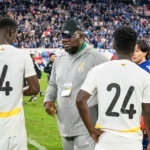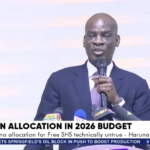
It is often said that nothing can stop a truth whose time has come. The unfolding events surrounding the death of the legendary Charles Kwadwo Fosuh — affectionately known as Daddy Lumba — seem to affirm this timeless wisdom. What began as a personal tragedy for the Fosuh family has rapidly grown into one of the most influential public conversations in recent Ghanaian history, stirring reflections on marriage, morality, culture, and social responsibility from Accra to Hamburg, from Kumasi to London.
The dispute over who should be recognised as the lawful widow of the late musician opened a national dialogue that many describe as long overdue. In an age where speculation travels faster than verified truth, Ghana has been compelled to confront uncomfortable realities about marital fidelity, legal rights, and the ethical dilemmas of modern relationships.
The death of the music icon has forced society to examine long-ignored contradictions between culture and law, love and loyalty, secrecy and responsibility.
One of the most striking developments arising from this matter is the emergence of Team Legal Wives — a powerful grassroots movement advocating for the rights of the lawful widow, Mrs. Akosua Serwah Fosuh. What began as scattered voices of sympathy quickly transformed into a unified global front of Ghanaian women and men who see in Mrs. Fosuh’s struggle a reflection of their own fears, experiences, and long-suppressed frustrations.
Central to the growth of this movement have been the influential voices of Adwoa Owusua, affectionately known as Ashanti Queen in Germany, and Obaa Tiwaa, widely recognised as Vim Power House in the United Kingdom.
Through their highly engaging TikTok platform, they have mobilised thousands — educating the public on marital law, debunking misinformation, and creating a global space where Ghanaian women can speak openly about the vulnerabilities and complexities of marriage. Their impact has been nothing short of phenomenal. Many viewers describe the platform as a classroom, a courtroom, a therapy session, and a community gathering place all at once.
As the movement gained momentum, leading supporter Ms. Pontonash noted that Team Legal Wives now operates like a structured organisation, complete with executive members across the globe.
She emphasised that Yaa Sika — widely known as Maame Sika in New York — has played a crucial and consistent role from the very beginning, championing the rightful legal recognition of Mrs. Akosua Serwah Fosuh. Pontonash expressed heartfelt appreciation to all executives, supporters, and silent contributors for their extraordinary dedication during this emotionally challenging period. Her remarks underscore the unity and strength driving this unprecedented wave of support.
Beyond their advocacy for Mrs. Fosuh, this emerging community has pledged to use its platform to defend and support women facing marital injustices — long after this case has ended.
But the rise of Team Legal Wives is only one part of this national awakening. Social media has become the unofficial arena where emotions, frustrations, humour, and moral concerns are expressed daily. Comments range from painful confessions to light-hearted satire. Yet beneath the humour lies an undeniable truth: the nation is wrestling with the realities of infidelity, cohabitation, inheritance, secrecy, and the legal consequences of relationships not grounded in marriage.
A Ghanaian resident in Hamburg, Mr. Osei Kofi (Oldburger), captured the national mood in a statement that has since gone viral:
“Even on his deathbed, Lumba is still entering people’s homes. He was indeed a hero.”
While humorous on the surface, the remark reflects a deeper sentiment — that even in death, the icon has compelled the country to confront sensitive issues long whispered about but rarely addressed openly.
For many married women, this case has become a source of empowerment, reinforcing that the law protects their dignity and sacrifices. For younger women and men, it has become a lesson in responsibility and long-term consequences. For society at large, it has served as a wake-up call to respect marriage, uphold ethics, and end the normalisation of double lives and secret relationships.
What began as a tragedy has evolved into a moral dialogue shaping the conscience of a generation. Beyond his music, the legacy of Charles Kwadwo Fosuh now includes an unexpected chapter — one that compels reflection, unity, and social reform. His voice may be silent, but the wave of change his passing has triggered continues to speak loudly across Ghana and the diaspora.
Indeed, even legends continue to teach — even in silence.
By Lumba Family Press Secretariat
- President Commissions 36.5 Million Dollars Hospital In The Tain District
- You Will Not Go Free For Killing An Hard Working MP – Akufo-Addo To MP’s Killer
- I Will Lead You To Victory – Ato Forson Assures NDC Supporters
Visit Our Social Media for More




